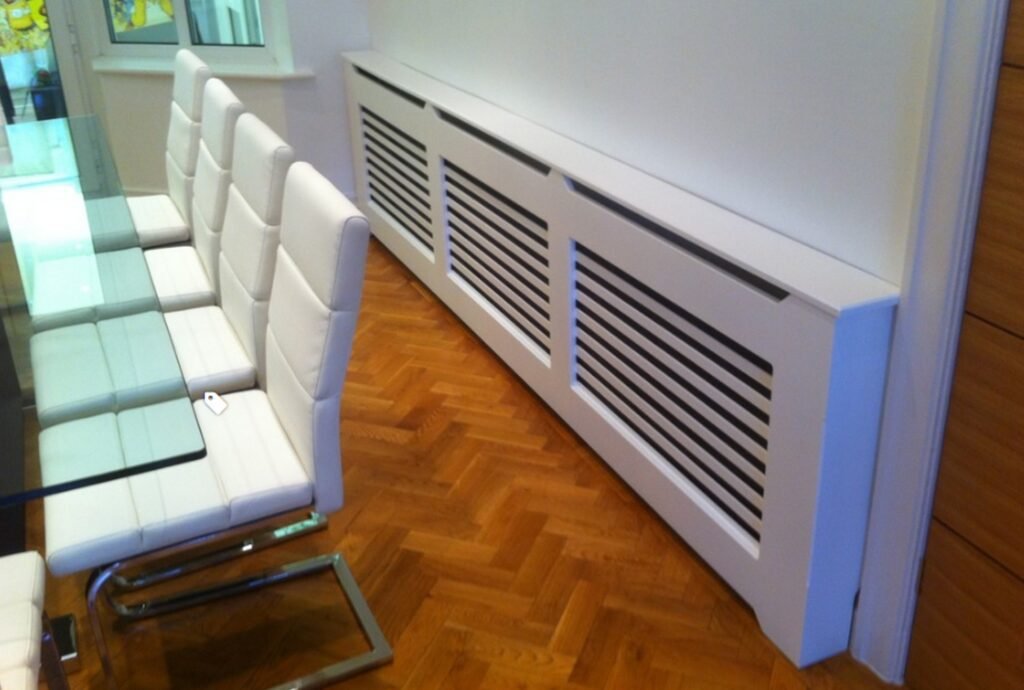Geothermal heat pumps have become more popular in recent years, but they have been around for decades. Geothermal systems use the ground’s relatively constant temperature to provide both heating and air conditioning. Geothermal systems can also be designed to supply a home with hot water.
Photo by Spaceworks Bespoke Joinery Ltd – Search dining room pictures
These systems take advantage of the fact that several feet below ground the earth has a fairly constant temperature. Underneath the earth, a temperature between 8 and 14 degrees Celsius is maintained the whole year through. During the winter, ground temperature is warmer than the air, and during the summer it’s cooler than the air.
As a result, heat can be transferred from the earth through “ground loops”—durable plastic pipes that contain a liquid—and channeled indoors. Once inside, the heat that has been captured by the ground loops is gathered in an air handler and distributed by an air delivery system (often the home’s existing duct system).
There are four basic types of systems, three of which (horizontal, vertical, and pond) have closed circulation loops. The fourth type of system is the open-loop option, which uses well or surface water as the heat exchange fluid that circulates through the system. Once the water has circulated through the system, it returns to the ground through a well or surface discharge.
Pros of Geothermal Heat Pump
1 – Geothermal heat pumps are more efficient than conventional heat pumps
Geothermal heat pumps are similar to conventional heat pumps, except they use heat from earth, rather than from the air. This is more energy efficient because the ground maintains a constant temperature just a few feet below the surface.
- Winter: the heat is moved from the earth into your house.
- Summer: geothermal pump pull the heat from your home and discharge it into the earth.
2 – Geothermal heat pumps are efficient and cost effective
Being energy efficient means less electricity costs and this, in turn, leads to savings. Additionally, this is around 70 percent cheaper than heating a home using electric heating, oil or liquefied petroleum gas.
3 – Geothermal heat pumps can heat household water
Geothermal heat pumps can come with a desuperheater device that can circulate into the regular water heater tank.
- In the summer time, the heat that is taken from the house would be expelled into the loop and will heat the water for free.
- In the winter, the desuperheater can reduce your water heating bills by half.
- Use your regular water heater for your other household needs in the spring and fall, to provide hot water.
- Ground-source heat pumps also maintain a comfortable humidity level inside the home. And, because they don’t rely on outside air for combustion.
4 – Geothermal heat pump – small size and low maintenance
A big benefit of a geothermal heat pump is its compact size. Another advantage is its low maintenance. No regular servicing or yearly checks are required.
5 – Geothermal heat pump – Environmental benefits
Obtaining energy from the earth and dispersing it using minimal electrical energy is an efficient use of a clean, renewable energy. Reduces energy consumption and cuts down on greenhouse gases and other pollutants created by the burning of fossil fuels—as well as with the processing and transporting of these fuels.
Cons of the geothermal heat pump
1 – Geothermal heat pump prices
The initial geothermal heat pump cost is rather high. The marginal cost of systems in new construction is substantially less since the new home would require ductwork (a major component of the cost) whether the home was equipped with a geothermal or conventional system. As a result, payback periods are often under ten years.
2 – Geothermal heat system needs a wide space
Wide space and long pipes are needed to lay the pipe system in trenches which means it is not ideal for suburban neighborhoods which are densely populated. The pipes may prove difficult to repair as they’re underground.
3 – Use of refrigerants
One of the disadvantages of this system is use of refrigerants. Refrigerants as well as the electricity to power the heat pump are not totally eco-friendly.
4 – Life of geothermal heat pump
The life of the geothermal heat pump averages 15 years. Therefore, it is essential to plan for replacement of heat pumps.
Conclusion
The feasibility and economics of these systems depends on the climate, soil conditions, available land, and local installation costs.
The principal arguments for geothermal systems are that they provide several environmental benefits and have lower operating costs than conventional heating and cooling systems.
The systems improve humidity control by maintaining about 50% relative indoor humidity. They are also quieter than air conditioners and are easier to maintain.
The Heating System of the Future – Radiant Heating Panels (howtobuildahouseblog.com)

